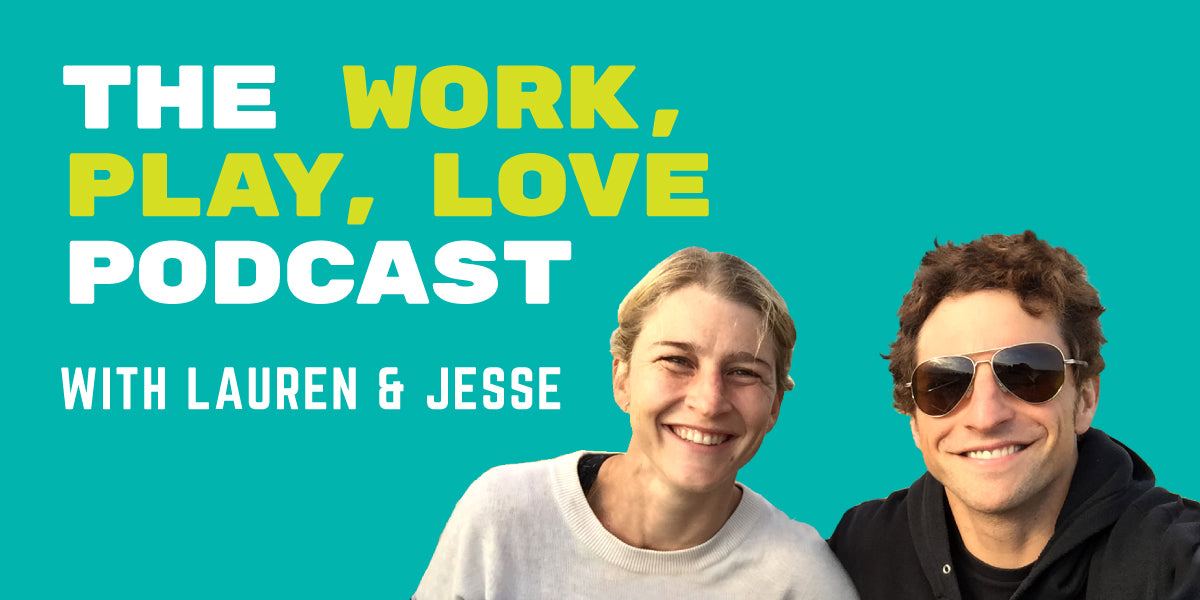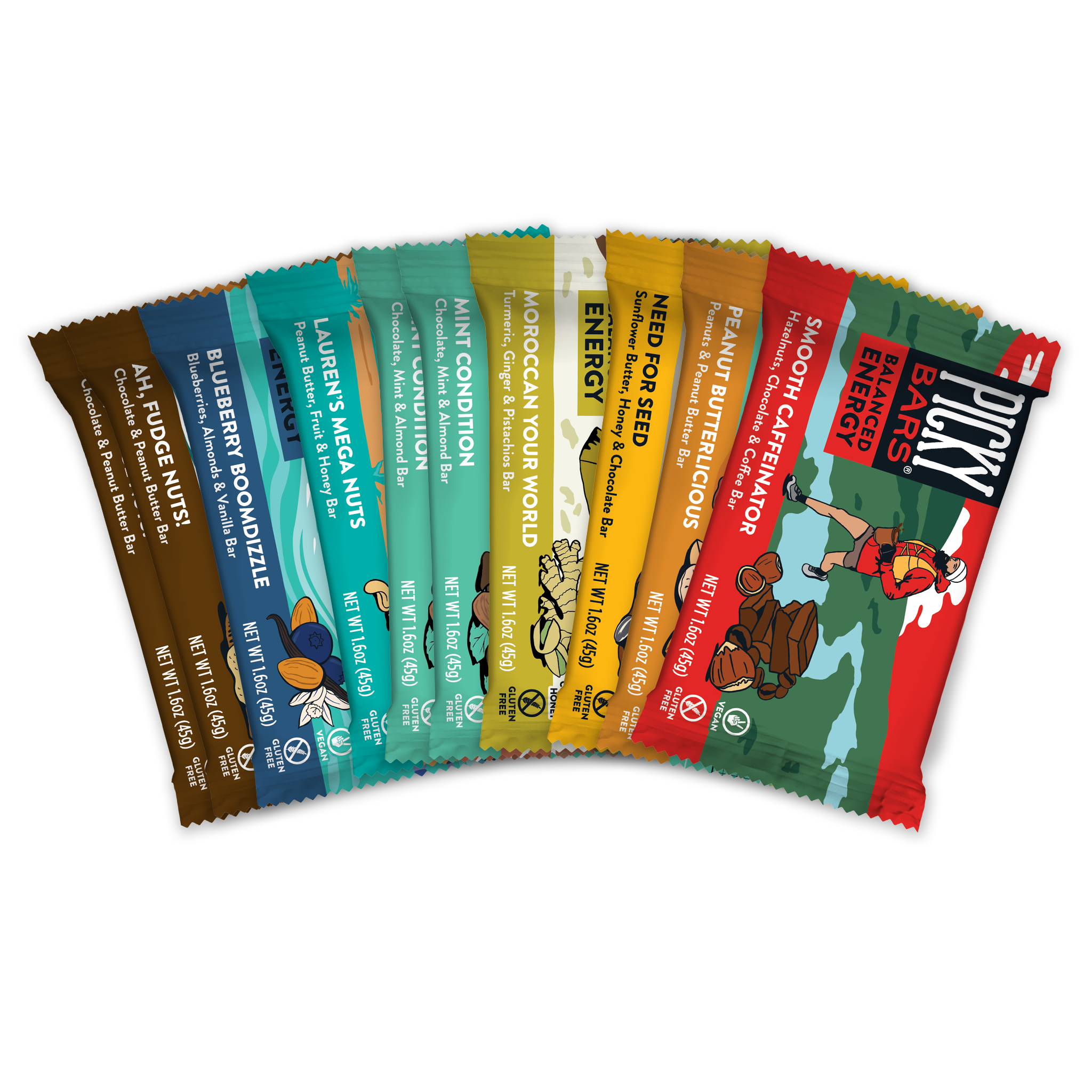

· By Sarah Conklin
36: Injuries, Motivation, Jesse's Marathon
Juggling work-life balance can be a real three-ring circus, which Lauren & Jesse know first hand. Led by listener questions, this new podcast is all about sports, biz, and family. [ASK YOUR QUESTION]
36: Injuries, Motivation, Setting Expectations, and Jesse’s Marathon Approach
iTunes | Spotify | Google Play | Stitcher
Description:
When you’re training hard and going after a big dream, not much is more disappointing than an injury. This is especially tough when the window of opportunity to achieve your goal is small or fleeting. So what do you do when that happens? Today, Lauren and Jesse answer questions about the highs and lows of play—and how re-setting expectations can have a big impact on your mental health and your race performance.
What's Goin' On:
When the highlight of your weekend is a four-hour car ride with your spouse, you know life is pretty sweet. Lauren and Jesse recount their weekend away in Portland for the Shamrock Run half marathon—which they both ended up winning! The two share their respective race stories and reflect on how their past selves might have approached the race differently. Jesse talks about his post-race lows, but is pumped to share some positive news about Picky Bars. Lauren gives a quick coaching update; she took her athletes to Eugene, OR where the team had fun conducting physiology testing on the treadmill.
Warm-up laps
22:46 - On runs, my left calf will get scratched or muddy because my right foot rubs on it. Every once in a while, my knees will bump together as well. I know it’s difficult to assess, but any suggestions you might be able to give?
J: We can’t offer advice about running technique without seeing you run. But I wanted to let this listener know that I come in from runs all the time where this has happened to me. So I feel like it’s not that big of a deal.
L: The main thing here is that it’s only happening on one side. And then the knees-bumping-together thing. I’m not a physical therapist, but my advice would be to see one! It sounds like you may have some glute/hip weaknesses that may be causing the issue.
25:45 – Should I bother learning to do a flip turn in the pool? I don’t have a swimming background and I feel anxious to do it because I am more focused on the turn than I am on my technique.
J: Yes. Learn how to do a flip turn. I was the same way, and I think it’s a natural reaction to have. But after a few sessions where I just focused on learning flip turns, I got to where I didn’t even think about it anymore. It happened really fast.
L: I felt the same way! Flip turns used to make me really anxious. It took me a while to learn—maybe a couple weeks—but it’s doable. I think, too, that since you’re trying to do this while training with your tri-club, that can add another layer of pressure and stress, and may be contributing to your anxiety.
J: Yeah. Maybe come to the pool a bit early and spend some time practicing flip turns. Then when you become more comfortable with them, work them into your workouts and race training.
28:33 – Why are track events measured by the meter, while road events are measured by the kilometer?
J: My gut tells me that because track events started with 100m, 200m, 400m, they kept the format as they added longer distances—5,000m, etc.
L: I don’t know! I kind of think along the same lines as Jesse. Because track events have shorter events it makes sense that they would use smaller measurements.
30:38 – What watch and/or app did Jesse use for the Shamrock Half to get the data he shared?
J: I used Garmin watch (any GPS watch), but Strava is what I shared that showed my splits. Strava’s a really cool app that shows you your splits.
32:45 – What are Lauren’s thoughts on the new Olympic qualifying standard for the marathon, and does she think the qualifying race should still be held in Atlanta?
L: I don’t feel super qualified to answer this question. I feel like there’s five people on the planet who totally understand this right now. Like the full ins and outs of qualifying standards. I do know that the intention of the changes is to make sure that the fastest people and the actual world’s best end up at the world championships. But I need to do some research about this.
The Meat and Potatoes
36:19 - When it comes to addressing a potential injury when it comes to the before-it-gets-bad-but-it’s-annoying phase, what to you recommend as a first step? Rest? Ice? Physical therapist? Last year I didn’t know where to start so I ran until my achilles couldn’t handle running at all. When it first started to bother me it seemed ridiculous to jump straight to “I need an MRI. Now!” Any guidelines about when to see a professional?
L: If you’re training for something where you anticipate little niggles or risk of other injury popping up, I recommend getting familiar with the health care providers in your area. Look for chiropractors who are familiar with Active Release Therapy. That has generally been my first stop. That, or a massage therapist who is truly an experienced sports massage therapist. Find someone who has those skills and make an appointment with them and start a relationship. That person should be your first stop when little things pop up.
J: I totally agree. I basically do the same thing. I have also developed a relationship with a physical therapist, and I find that to be really valuable. It’s very smart to proactively seek help when things are getting to a 4-7 on the pain scale.
L: Your first stop should not generally be an orthopedist. They are usually folks who are there to help when the problem is more advanced, or the pain is heightened. They’re the ones to say it’s MRI time. It’s also a good idea to ask around in your running community to see if they have advice or can refer you to a good physical therapist, massage therapist, or chiropractor.
41:15 – I have my first half marathon for the first time in two years coming up. And after that, I have an Olympic triathlon. But I’m struggling with motivation. Due to some injury flare-ups, I’ve had to cut back on my training—and so while I think I will finish the half, I’m not sure I’ll perform very well. The main issue is that I’m feeling really “blah” about training. If I didn’t have the race and the tri on the calendar, I would take a break from exercise. I’m feeling a lot of pressure from myself to make my training and races go super well. But that pressure isn’t translating into more committed training like it has in the past. Any advice?
L: I think a two year break is significant. And I think there will be a natural tendency to want to compare yourself to the you before you were injured. And so you have these expectations for how you trained and performed before. When your current reality isn’t meeting those expectations, it can be cause for dissatisfaction. So I think re-aligning your expectations can be helpful. I would say let’s go back to the basics of participating in a race. Sign up. Train more regularly, even if you don’t do the perfect training program. You’re out there, you’re working out regularly. You probably won’t go into the race super fit, but you can put down a mark that says “OK, this is the new me, I’m not going to think about old me.” You’ll probably surprise yourself. You’ll find that you’re stronger in ways you didn’t expect. You’ll find that you have trouble in other areas you didn’t anticipate. But it gives you a new benchmark to help you get motivated for the next event you decide to do. The biggest thing to do is take a deep breath and get something different out of this than you thought you were going to get.
J: I completely agree with Lauren here. Treat this as a starting point. I had a long injury and missed a bunch of time when I was a sophomore in college and coming back as a junior I was constantly comparing myself to me as a freshman or younger. I always felt I was behind, and that was super de-motivating to me. I spent six months where I didn’t race, even though I was capable of doing so. Ultimately, what got me out of that funk was reducing expectations and realizing that I needed to take A step forward in order to take multiple steps forward. That’s what I would recommend.
L: I think it can be really fun to race underprepared, too—like totally own it. Maybe sign up for that kind of approach this time and see how it feels.
46:31 – Who’s coaching Jesse in his marathon? And what is his marathon approach?
J: Matt Dixon is still coaching me—he’s giving me an overall plan. But we’ve had a really collaborative relationship over the past few years, and so I’m making a lot of tweaks to his plan based on the other things I’m balancing in my life. Matt is giving me the overall structure, really making sure I’m building to where I need to build to. But I’m taking a lot of leeway on the schedule—allowing myself to be flexible for work and family in the ways I need to. For the specifics, I aim for 50-60 miles a week over the course of 15-16 weeks to build up. That’s five-ish runs a week. Then I supplement those runs with two cross training sessions—a bike and a ski.
L: I don’t chime in too much except to give him a hard time about doing too much on days he feels good ;)
51:38 – I finally qualified for the Boston Marathon after dreaming about it for many years. But now I’m dealing with chronic injuries that are preventing me from training. How do you manage expectations for an event you’ve been dreaming about and working very hard for when you’re not sure how it might shake out, or you’re not sure that you’ll even finish the race?
L: In 2012 I qualified for the Olympic trials, but months before, I got an IT band injury while training for the New York marathon. It was awful. And it wouldn’t go away. As the event got closer, I was cross training a ton—in the pool a lot—and running around 7 miles a week. And my event was the 5,000m. So I knew going into the race that I was not going to be competitive. And it was really, really hard. But what ended up getting me there was this question: is it still worth doing something just for the sake of doing it? When you can let go of what you wanted it to be and be open to it being something different, what might happen? So I started to shift my mindset to curiosity. If you can get yourself there, you may be really surprised to what your event offers you.
J: I agree completely. It’s also good to keep in mind that you just never know how things will go. You can really surprise yourself. If you can show up to Boston feeling confident that you’re going to run as long as you can (and walk if you need to), my guess is you’re going to feel better than you think. You might be sore as shit afterwards because your body wasn’t ready for it, but you’ll get to experience something that was really important to you.
L: You won’t be the only one having that experience.
J: Yeah – you won’t be the only one.
Follow-ups
59:20 - Today’s listener follow-ups include thoughts on:
- Gender-neutral alternatives to “GUYS”
- The “stress bucket”
- Post-race letdown
As always, submit your work/play/love question at pickybars.com/workplaylove - Thanks for listening!

[ PAST EPISODES + DESCRIPTIONS ]





